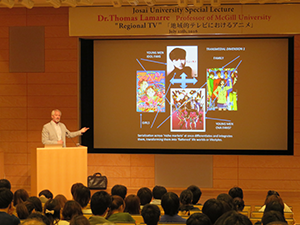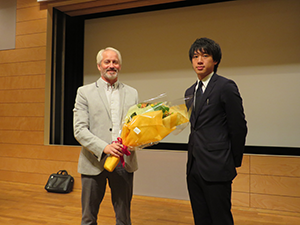- HOME >
- NEWS >
- Josai Hosts Keynote Lecture by McGill University Professor Thomas Lamarre as Part of 50th Anniversary


On July 12, 2016, Josai University Educational Corporation hosted a keynote lecture by Thomas Lamarre, Professor at Canada’s McGill University and scholar of Japanese anime and literary studies, on the topic of “Regional TV” at the 1st building auditorium on the Tokyo Kioicho Campus.
More than 150 attendees―including researchers, Josai International University students from the Faculty of Media Studies, and other students and faculty―crowded the lecture hall to attend this special lecture (organized as part of Josai’s 50th anniversary festivities) from one of the most insightful scholars working in Japanese anime today.
Mr. Lamarre received his PhD from the East Asian Languages and Civilizations department at the University of Chicago and is currently a professor at McGill University. Beginning his career as a scholar of the humanities researching The Tale of Genji, Professor Lamarre has worked in a wide-range of fields, from the writing of Junichiro Tanizaki to cinema studies, making significant academic contributions along the way.
In addition, Mr. Lamarre’s book The Anime Machine (2009), which traces the history of Japanese anime through the close analysis of specific works, techniques, and social context, is a highly regarded study which has received publishing awards from the European Association of Japanese Studies (EAJS) and the Society for Cinema and Media Studies (SCMS), among others.
Professor Akira Mizuta Lippit of Josai International University provided a brief introductory speech before Professor Lamarre’s lecture. He said, “It is the duty of today’s universities to promote globalization and, with Josai International University’s Faculty of Media Studies as the center, we continue to accumulate efforts to create a place where global exchange between universities, scholars, and students is possible. And one of the main topics in this global exchange, which is closely linked to the subject of today’s lecture, is that of e-learning. This is why we are very pleased to welcome Professor Lamarre, a scholar who continually generates important research on a global level.”
Professor Lamarre, taking the works Captain Tsubasa and Boys Over Flowers as the main subjects of his talk, emphasized the importance of not simply analyzing the anime works themselves, but to carefully the consider the conditions in which these works were produced, circulated, and consumed. His lecture then discussed the various ways in which the anime content of these works are circulated in global society. Regarding Captain Tsubasa, a series that possesses a rich history that extends from the 1980s to the 2000s, Professor Lamarre underscored the different ways in which this work was viewed in Japan, the Middle East, and Europe and how its reception relates to the international situation. For Boys Over Flowers, Lamarre focused on its mixed media circulation in the form of manga, anime, TV drama, film, and other media forms.
In response to student questions about inter-media circulation, Professor Lamarre said, “While I’m opposed to the media mix that simply recycles the same works for commercial purposes, with inter-media circulation there is also the possibility to produce something new that cannot be recuperated by commercial forces.”
|
Professor Mizuta Lippit gives |
Professor Lamarre delivers |

Audience members listen with rapt interest

Professor Lamarre receiving a bouquet from a student
